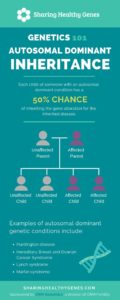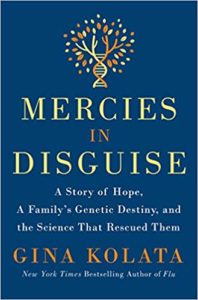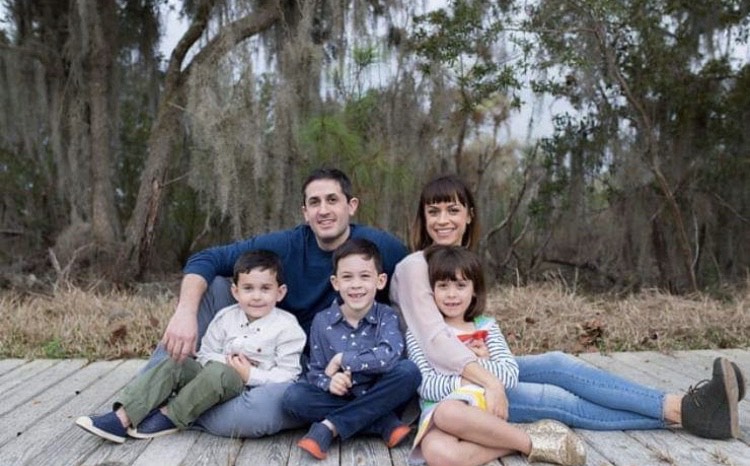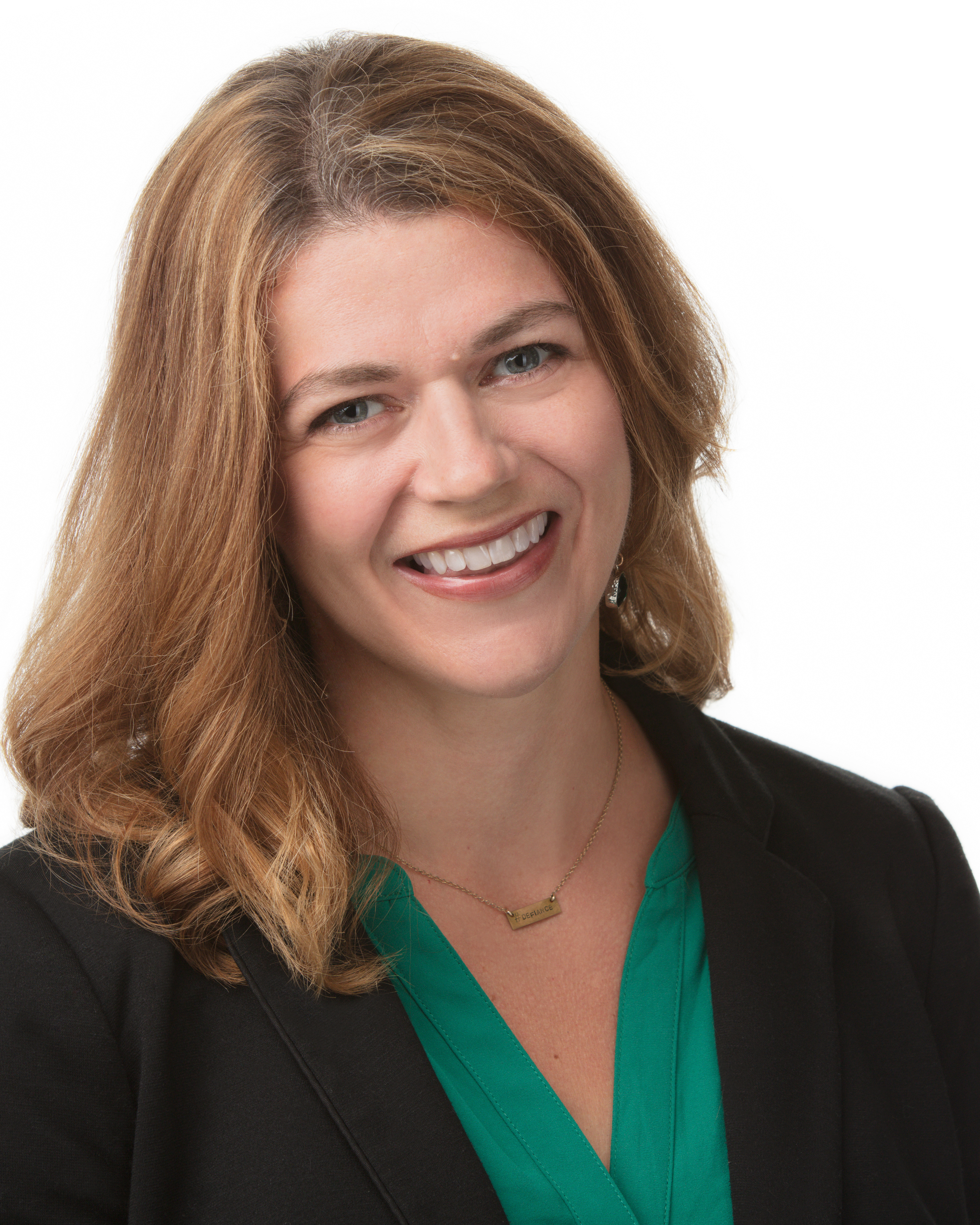For most of us, there is no single day that defines the course of our lives. No obvious line in the sand delineating the “before” from the “after.” For Amanda Kalinsky, however, there is most assuredly a day – April 22nd, 2009. It was the day she found out she inherited the disease that has plagued her family for six generations.
The Condition
The disease running through Amanda’s family was Gerstmann-Straussler-Scheinker (GSS) disease. It is a form of genetic prion disease, a rare inherited condition that causes progressive neurological impairment due to a degeneration of the cerebellum in the brain. Initial symptoms can begin anytime between ages 35 and 55 and may include clumsiness, unsteadiness, and difficulty walking. As the disease progresses, affected individuals eventually lose the ability to walk, speak, or eat on their own. Most will eventually develop dementia. The condition is ultimately fatal, anywhere from two to ten years after symptoms begin.
Impact of Genetics
 Amanda is keenly aware of this progression. She watched her father, a physician, go through it along with her paternal grandfather and a paternal uncle. The condition is inherited in an autosomal dominant manner, meaning there was a 50% chance for Amanda to inherit the disease-causing mutation. That also meant there was a 50% chance for each of her future children to inherit the condition as well. Amanda always wanted to have children, but after learning her status, she felt that may no longer be possible, at least not biologically. “I could not bring a child into this world knowing that they would have a 50% chance of inheriting this deadly mutation…For me, that was just not an option.”
Amanda is keenly aware of this progression. She watched her father, a physician, go through it along with her paternal grandfather and a paternal uncle. The condition is inherited in an autosomal dominant manner, meaning there was a 50% chance for Amanda to inherit the disease-causing mutation. That also meant there was a 50% chance for each of her future children to inherit the condition as well. Amanda always wanted to have children, but after learning her status, she felt that may no longer be possible, at least not biologically. “I could not bring a child into this world knowing that they would have a 50% chance of inheriting this deadly mutation…For me, that was just not an option.”
Part of the reason Amanda sought out genetic testing is that she and her then-boyfriend were at a serious point in their relationship, and she had begun to think about marriage and starting a family. Knowing what it meant for their future, her now-husband proposed the day after she received her positive test results. And not too long after they got married, they started investigating options to begin a family. After first considering adoption, Amanda found herself longing for her own biological kids. Preimplantation genetic testing (PGT) had been mentioned as an option for conception by the genetic counselor Amanda saw during her genetic testing process, but it had never before been used for genetic prion disease. After much consideration and deliberation, they decided to be guinea pigs, the first couple to pursue PGT for GSS.
Mental Warfare
Amanda describes the mental warfare going on during this time as intense. There were just so many emotions – the joy of getting married, the fear and despair over the diagnosis, and the ethical and moral debate brought about by the decision to pursue IVF with PGT. Amanda, raised Southern Baptist, questioned whether she considered disposing of embryos that were “sick” as abortion. There is also this stigma around PGT that it is used to create designer babies. After educating herself, Amanda came to the conclusion that the choice to conceive this way is far from abortion or creating designer babies. It’s saving a future generation from a debilitating disease and a graceless death.“This is a life we’re talking about, not an eye color.”
The process of undergoing IVF with PGT was not always easy. Amanda’s body was incredibly responsive to the hormones which was good news for her chances to conceive but hard on her physically. She gained weight, often felt sluggish, and experienced some short-term memory loss. Despite these setbacks, the procedure was successful, and Amanda delivered twins, Ava and Cole, in 2011 and another son, Tatum in 2016 from embryos frozen during her initial IVF cycle. When asked what she most wanted people to know about IVF with PGT, she replied without hesitation: “God it was worth it. It was so worth it.”
For Amanda, PGT was a way to end the devastating disease that ravished her family and that will likely take her life one day. She cannot change the fact that she inherited the disease, but she could prevent her children from doing so. The diagnosis stole her power and her strength, but PGT gave her that power back. While Amanda is certainly concerned about her own health and how the disease will one day impact her life, she is buoyed by the pure happiness she sees in her children and by the knowledge that they will not have to face the same hard questions and tough decisions.
Telling Her Story
 Looking back on this journey, Amanda realizes that the one thing that may have helped is being able to talk to someone else who had been in her shoes while she was going through the diagnosis and then through IVF with PGT. She needed someone to hold her hand through the process or “not even…my whole hand, but just my finger to pull me along.” She wants to be that person for somebody. Amanda now mentors several couples who are actively going through IVF with PGT, and she speaks openly about her family’s story to both the media and to advocacy groups that support genetic prion disease, like the Creutzfelt-Jakob Disease Foundation. She even opened up to what she calls “consensual invasiveness” for the book Mercies in Disguise, a memoir of sorts that chronicles her family’s struggle with GSS and her personal decision to pursue IVF with PGT to stop it. The emotionally daunting task of reliving every moment of her life with GSS to date resulted in this beautifully written narrative that chronicles Amanda’s journey. While “cool” to be featured in a book written by an award-winning writer for The New York Times, the greatest gift of this project was having something tangible to leave her children. “They can read my words when I am no longer able to say them. It’s absolutely priceless.”
Looking back on this journey, Amanda realizes that the one thing that may have helped is being able to talk to someone else who had been in her shoes while she was going through the diagnosis and then through IVF with PGT. She needed someone to hold her hand through the process or “not even…my whole hand, but just my finger to pull me along.” She wants to be that person for somebody. Amanda now mentors several couples who are actively going through IVF with PGT, and she speaks openly about her family’s story to both the media and to advocacy groups that support genetic prion disease, like the Creutzfelt-Jakob Disease Foundation. She even opened up to what she calls “consensual invasiveness” for the book Mercies in Disguise, a memoir of sorts that chronicles her family’s struggle with GSS and her personal decision to pursue IVF with PGT to stop it. The emotionally daunting task of reliving every moment of her life with GSS to date resulted in this beautifully written narrative that chronicles Amanda’s journey. While “cool” to be featured in a book written by an award-winning writer for The New York Times, the greatest gift of this project was having something tangible to leave her children. “They can read my words when I am no longer able to say them. It’s absolutely priceless.”
Amanda’s personal journey with GSS is ongoing. She is currently healthy and committed to staying that way as long as possible. When she began experiencing some balance and slurring issues, she went straight to her neurologist, terrified it was the symptoms of GSS beginning. After evaluating her, he wisely reminded her that stress itself can be just as dangerous as the disease. His prescription? Mindfulness training, which along with yoga and running, Amanda now credits as her stress relief and her therapy.
PGT cannot save Amanda. But it has saved her children from genetic prion disease. For that, she is profoundly grateful.


Jessica Greenwood is an independent consultant to Sharing Health Genes. As a licensed genetic counselor and digital health consultant, she works with health-related organizations looking to deliver memorable messages of health in the digital space. Mrs. Greenwood started her career in a clinical role, working for eight years as a preconception and prenatal genetic counselor before transitioning to industry. Mrs. Greenwood completed a year-long certificate program in Digital Health Communication at Tufts University that spearheaded her work in digital health. She now consults with health-related organizations, assisting with the creation and execution of a digital strategy including the development of health literate patient-centered educational materials. Mrs. Greenwood earned a Bachelor of Science degree from North Carolina State University with a minor in Genetics and a Master of Science in Genetic Counseling from the University of North Carolina at Greensboro.